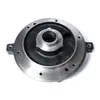Mobile:+86-311-808-126-83
Email:info@ydcastings.com
High-Efficiency Exhaust Impeller for Enhanced Engine Performance and Reduced Emissions
The Importance of Exhaust Impellers in Modern Engineering
In the realm of modern engineering, efficiency and performance are pivotal factors driving the design and implementation of various mechanical systems. Among these components, the exhaust impeller plays a critical role, particularly in turbochargers and exhaust systems for both automotive and industrial applications. This article delves into the significance, functionality, and advancements surrounding exhaust impellers, underscoring their essential contribution to enhanced performance and environmental sustainability.
Understanding Exhaust Impellers
An exhaust impeller is a type of centrifugal impeller used specifically to draw in exhaust gases and enhance their expulsion from an engine or mechanical system. It operates on the principle of centrifugal force, converting rotational energy into linear kinetic energy, which propels exhaust gases out of the system more efficiently. By improving the movement of exhaust gases, exhaust impellers help increase overall engine efficiency, power output, and fuel economy.
Functionality and Design
The design of an exhaust impeller is crucial to its effectiveness. Impellers are typically crafted from high-strength materials such as aluminum, titanium, or composite materials to withstand the extreme temperatures and pressures encountered in exhaust systems. The shape and design of the blades on the impeller are optimized to ensure maximum airflow and minimal turbulence.
In a turbocharger system, for instance, the exhaust impeller is positioned in the turbine housing, where it harnesses the energy of the exhaust gases produced by the engine. As exhaust gases flow through the impeller, they spin the turbine, which in turn drives the compressor side of the turbocharger. This process effectively increases the amount of air entering the engine, leading to greater power output without the need for a larger engine.
Applications in Automotive Industry
In the automotive industry, exhaust impellers are integral to the functionality of turbocharged engines. They enable smaller engines to produce power comparable to larger engines while maintaining fuel efficiency. This is particularly beneficial in today’s market, where consumers are increasingly concerned about fuel consumption and emissions.
exhaust impeller

Moreover, modern exhaust systems increasingly integrate variable geometry impellers. These are designed to adjust the angle and position of the blades based on engine speed and load. This capability allows for improved responsiveness and reduced turbo lag, thereby enhancing driving performance and the overall driving experience.
Environmental Considerations
As regulations surrounding emissions continue to tighten, the importance of exhaust impellers becomes even more pronounced. Efficient exhaust systems equipped with high-performance impellers can lead to a reduction in harmful emissions by enabling more complete combustion of fuel. The result is not only a cleaner environment but also compliance with stringent regulatory standards.
Furthermore, advancements in materials science have paved the way for the development of lightweight and durable impeller designs. These innovations allow for better performance while contributing to the overall weight reduction of vehicles, leading to improved fuel efficiency and lower emissions.
Future Trends
The technological advancements surrounding exhaust impellers are perpetual. In the future, we can anticipate the integration of smart technologies that monitor the performance of exhaust systems in real-time. These systems could automatically adjust impeller configurations based on various parameters such as engine load and environmental conditions. Additionally, with the rise of electric vehicles, there may be opportunities to innovate exhaust systems in a way that aligns with electric propulsion technologies.
Research and development are also focusing on advanced computational fluid dynamics (CFD) simulations that allow engineers to optimize impeller designs more effectively. These simulations can lead to breakthroughs in understanding how different shapes and sizes of impellers affect performance, thus pushing the boundaries of design capabilities.
Conclusion
Exhaust impellers are a vital component in the mechanical engineering landscape, particularly in automotive applications. Their ability to enhance engine performance while promoting environmental sustainability makes them more relevant than ever. As engineering technologies evolve and the world shifts toward stricter emissions standards, the continued advancement and optimization of exhaust impellers will undoubtedly play a crucial role in shaping the future of transportation and industrial systems. As we look ahead, it is clear that the engineering community will continue to innovate to meet the challenges posed by modern efficiency and environmental goals, with exhaust impellers at the forefront of this endeavor.
-
Why Should You Invest in Superior Pump Castings for Your Equipment?NewsJun.09,2025
-
Unlock Performance Potential with Stainless Impellers and Aluminum End CapsNewsJun.09,2025
-
Revolutionize Your Machinery with Superior Cast Iron and Aluminum ComponentsNewsJun.09,2025
-
Revolutionize Fluid Dynamics with Premium Pump ComponentsNewsJun.09,2025
-
Optimizing Industrial Systems with Essential Valve ComponentsNewsJun.09,2025
-
Elevate Grid Efficiency with High-Precision Power CastingsNewsJun.09,2025











